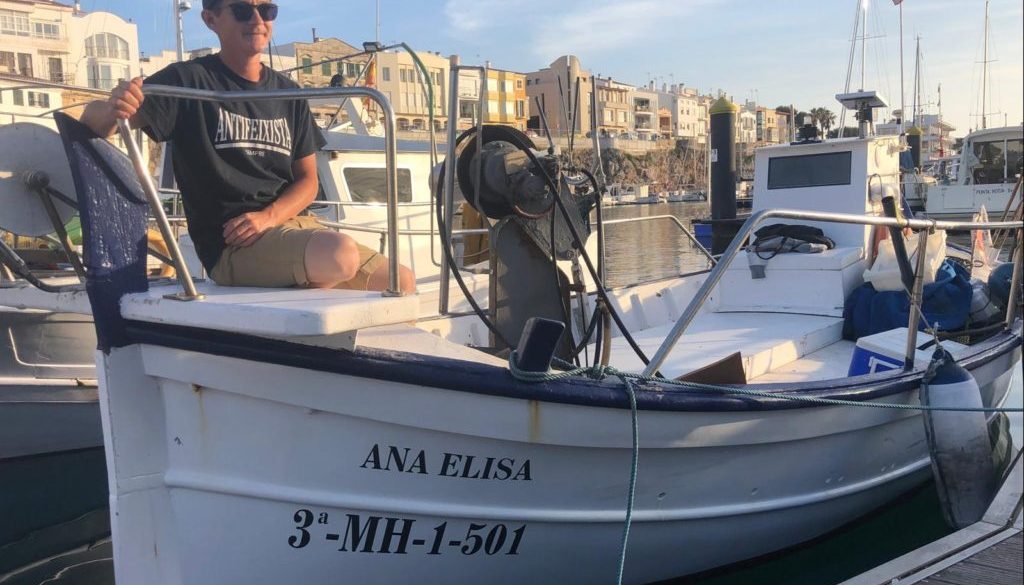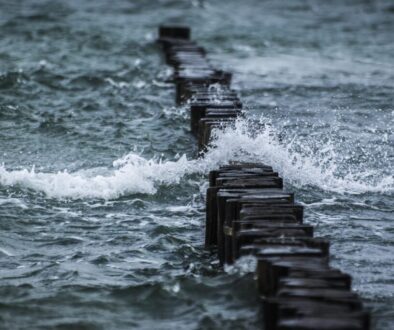Following a family tradition established by his grandfather and elder brother, 29-year-old Bosco, decided to buy his first fishing boat in 2021. This made him the youngest independent fisherman in Ciutadella in Menorca, Spain. After seven years as a crew member on his brother’s boat, he decided to take the leap that many fishers dream of making one day; to become his own boss by being the skipper of a fishing boat.
“Having to decide for oneself where to set the nets is not the same as being told where to set them”, says Bosco. However, despite the experience gained from fishing with his brother and the good fortune of inheriting the traditional ecological knowledge of his fishing family, being the skipper of a fishing boat is no easy task, no matter how small and artisanal the vessel is.
The lack of generational renewal in fishing is a major problem that is putting the future of the sector at risk in many ports in this region. Very few young people decide to work at sea; it is a very unattractive profession for young people, although as Bosco’s brother confides “if you like it, it is the best job in the world. You don’t have a boss, you decide on the number of hours you want to work and you can earn a good living”. Those who do take the plunge, like Bosco, encounter many obstacles before being ready to put to sea for the first time.
Bosco’s first step was to choose and buy a boat, in this case a typical Mediterranean llaüt. His budget was limited; he did not count on any external support, and he only had his own savings and those of his partner. Nowadays several fishermen retire every year in the Balearic Islands and the Catalan coast, so finding a licensed fishing boat is easy. However, in Bosco’s case, like most young fishers, his limited budget forced him to buy a rather old llaüt. In September 2021, he bought the boat from a retired fisherman in the port of Ciutadella.
Buying an old boat means more maintenance work. In this case the engine needed fixing as it wouldn’t start, and “it’s not so easy to find a reliable mechanic on the island, many already work with several fishermen but don’t necessarily accept more work”, Bosco shares. On the other hand, fishing boats nowadays have more and more technology, including at least a depth sounder and a GPS. These devices allow for more precise and fruitful fishing, even if this represents an investment.
In September 2021, Bosco told me, for example, that he would like to be able to install a computer programme that allows him to see the seabed in 3D, a programme that many fishermen carry, but he can’t find anyone on the island who wants to sell him the programme, or he doesn’t know where to buy it. Setting up a boat involves being an electrician, a mechanic, a painter, savvy about repairing fishing gear, as well as being capable of dealing with the administrative tasks, which are complex in the fishing sector. Fortunately, for these he has the support of the secretary of the fishing guild (Cofradia) and his partner, an accountant and manager. Thus, the first few months after buying his boat were dedicated to getting the boat and the fishing gear ready: “Every day there is a new surprise, but little by little I’m getting there”, he says.
However, when I asked him what was the most difficult thing about starting out as a self-employed fisherman, I was surprised by his answer: “I don’t know how much I have to charge (for my fish) to cover my expenses”. Being a fisher means being an entrepreneur, each boat is a small business, it has its fixed costs such as mooring fees or loans, but also many variable costs such as fuel, boat maintenance, port taxes on the catch and various other taxes. “As a crew member I didn’t have access to the accounts of the boat/company, I don’t know exactly how much we charged as I was paid on a share basis, according to what we caught”.
Secrecy in fishing is a common and a normalised concept among fishermen. Although in this case, the skipper with whom he worked for the last 7 years was his brother, there was still some kind of secrecy about the company’s accounts. Being a successful fisher nowadays involves knowing not only how to fish, but also how to sell and manage a business. In this respect, it is worth noting that professional nautical-fishing training courses do not offer any training in fishing company management, accounting, etc. In the past, women played an important role in the management of the accounts, as they were in charge of selling the fish for the men in the family. This is no longer the case today, and although the traditional family fishing business model is disappearing, Bosco does have the support of his partner who works as an accountant and administrative manager, “I am lucky to have her support, she encouraged me to buy my own boat”, he says.
There is no fish market or auction system in Menorca, and sales are carried out directly, which means that each fisher has to establish his or her own sales channels and find a way to sell the daily catches. “I still don’t know who I’m going to sell the fish to”, says Bosco. In a place as small as Menorca, the sales channels are already established between fishermen and wholesalers and it is not easy to carve out a niche for yourself, especially in winter when demand is low. Fishing is a sector where cooperation and competitiveness exist side by side. If you have a serious problem at sea, you can usually count on the support of the other fishers, but on land this cooperation does not always exist.
In April 2022, at the start of the lobster season in Menorca, and after a winter spent getting the boat and fishing gear ready, Bosco officially started work. Due to bad weather, he was only able to go out for 9 days in that first month of the year. At the end of April, he told me that the second day he wanted to go out, his engine failed and he had to go to lift the nets with his brother’s boat. “It was a bit sad to fish my first lobsters with my brother’s boat and not with mine, … but my boat is now fixed”.
I was surprised to see that he was not going out alone, his sister has accompanied him today as a crew member, it is also a first time for her. She has never worked as a fisherwoman before, and she has come to try it out, she tells me. She is not the only fisherwoman in the port as two other girls are working on their father’s boat.
That same day at the end of April, I saw Bosco in front of the Ciutadella fishermen’s association waiting to weigh his catch after arriving at the port while talking about his day at sea with Andreu, another fisherman with whom he has a good relationship. He seemed cheerful although not entirely happy with his catch; he has 4 or 5 lobsters “only” but also a few fish. With these catches you can cover your daily expenses at least! says Andreu to cheer him up. The lobster season continues until the end of August.
Annya Crane
The data collected for this article are the result of several conversations with Bosco during 2021 and 2022.




